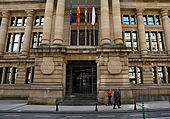Company in San Vicente Supplying Prohibited Materials to Russia Dismantled
The dismantled company was part of a European commercial structure set up to conceal the final destination of the prohibited goods | Three individuals have been arrested, two of whom have been imprisoned
Alejandro Hernández
San Vicente del Raspeig
Wednesday, 18 June 2025, 10:55
Operation led by the Central Court of Instruction number Two of the National Court has successfully dismantled a front company in San Vicente del Raspeig that was supplying prohibited goods to the Russian Federation. The dismantled company was part of a European commercial structure established to hide the final destination of the prohibited goods, according to police sources.
The investigation, carried out by the National Police and Customs Surveillance of the Tax Agency, in collaboration with the National Intelligence Centre (CNI), has resulted in the arrest of three individuals for their alleged involvement in smuggling prohibited goods.
The arrested individuals allegedly used the commercial company, created as a front company, to mask the shipment of dual-use materials to the Russian Federation, violating existing prohibitions. They employed a triangulation scheme, using companies located in other countries to conceal the final destination of the materials, with one of the detainees acting as a front man.
The alleged criminals managed to evade established controls by sending the goods through various European customs, declaring a third country as the final and fictitious destination, from which the materials were re-exported to the Russian Federation, the true final destination under embargo.
The arrests took place on June 10 in the province of Valencia, and the headquarters of a commercial company in the Alicante town of San Vicente del Raspeig was searched, where various computer equipment, electronic devices, and documents were seized and are being analysed by specialists.
'Operation Sharma-Konturi'
The investigation began at the beginning of 2024, when agents became aware of the purchase and sale of a commercial company established in Spain dedicated to the international trade of machinery.
After various inquiries, investigators found that the detainees used the company created for this purpose to facilitate the exit of products through different European customs, declaring a third country as the final and fictitious destination of the machinery, from which it would later be re-exported to the Russian Federation, the true final destination of the goods, using classic logistical, documentary, and financial triangulation mechanisms. This allowed them to evade established controls for the export of defence and dual-use materials.
The detainees also falsified the documentation and labelling of the products to conceal the true nature of the materials included in the embargo on Russia.
In this operation, agents have confirmed the export of various embargoed machinery worth hundreds of thousands of euros. At the end of this business network was a Russian company sanctioned by international organisations.
The Machinery
The exported dual-use machinery consists of automated machine tools capable of producing complex parts. They are mainly used in mass production industries, such as the automotive metallurgical industry, the aerospace industry, or also in the military industry.
These machining centres, which due to their capabilities may have applications in the military industry, are considered, according to European regulations, dual-use materials, according to the Police.
Smuggling of Prohibited Goods
Thanks to the actions of the investigators, a commercial structure created to supply prohibited materials to the Russian Federation has been dismantled, thus preventing the shipment of new consignments of this type of material.
The 'Operation Sharma-Konturi' is directed by the Central Court of Instruction number Two of the National Court and has been carried out jointly by the General Information Commissariat, the Customs Surveillance Directorate of the Tax Agency, and the CNI. It has also received support from the Provincial Information Brigades of Valencia and Alicante, and the Regional Areas of Customs Surveillance of Catalonia and Valencia.
Last Friday, the detainees were brought before the competent Central Court of Instruction judge, who ordered the imprisonment of two of the detainees, while the third was released with precautionary measures.




